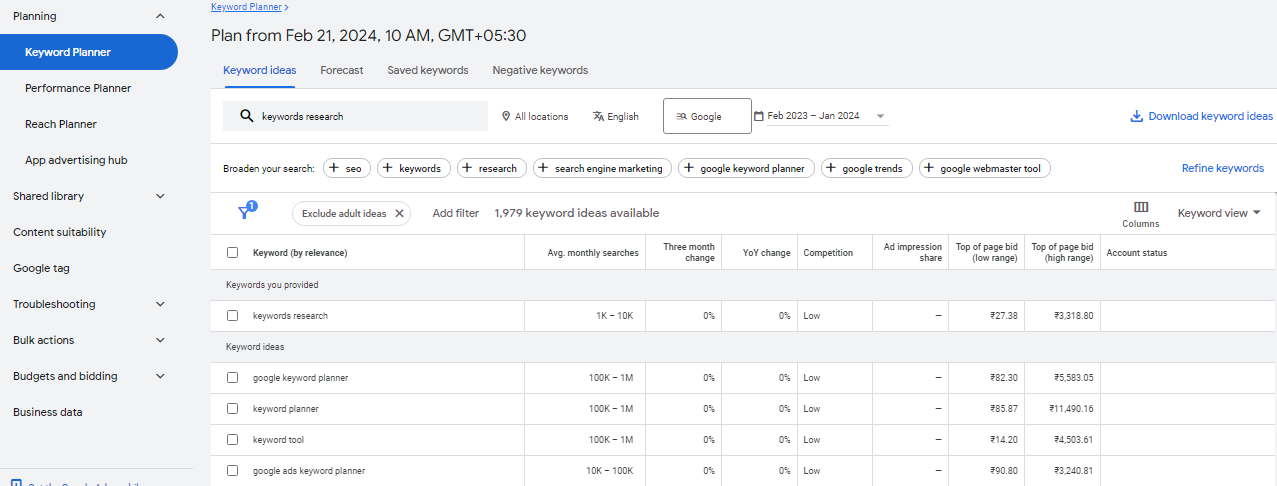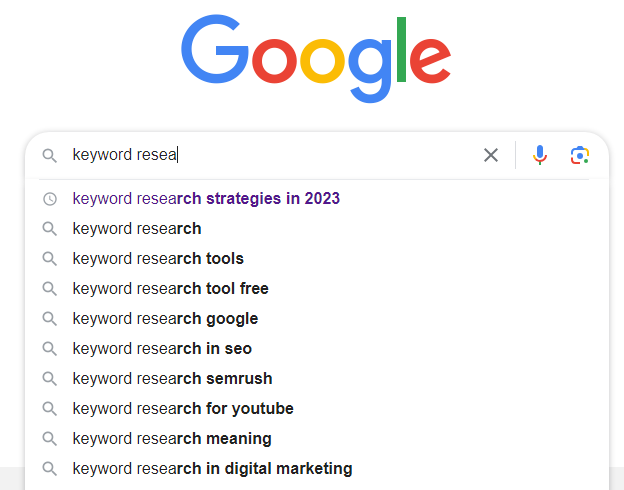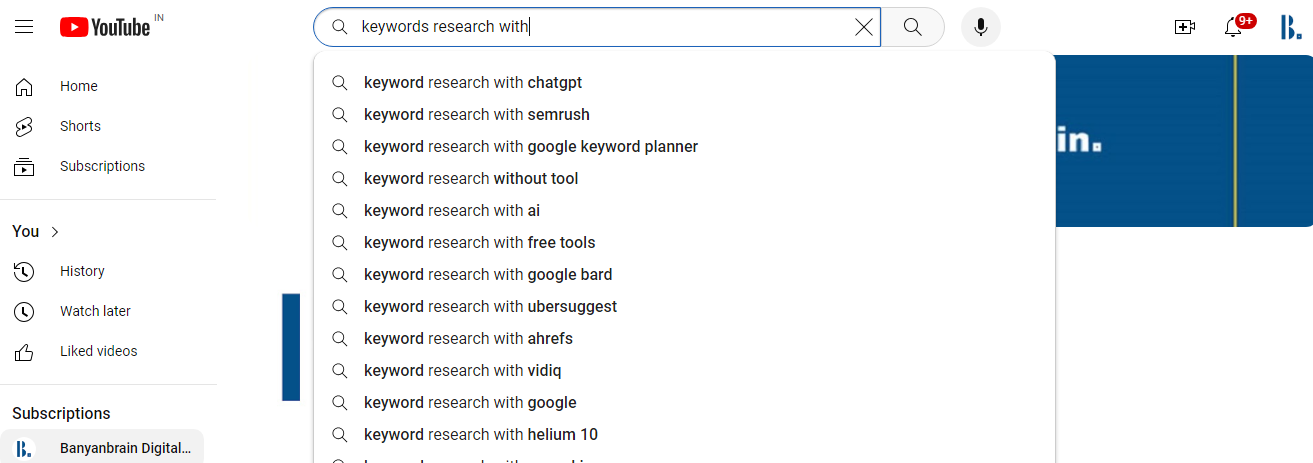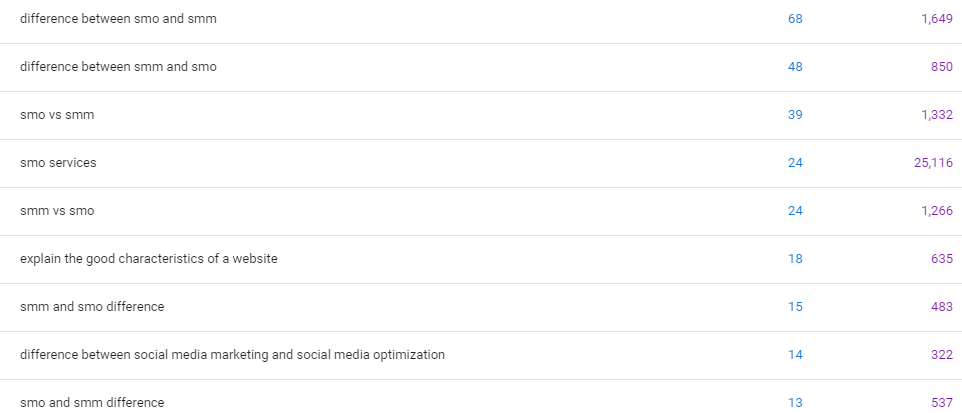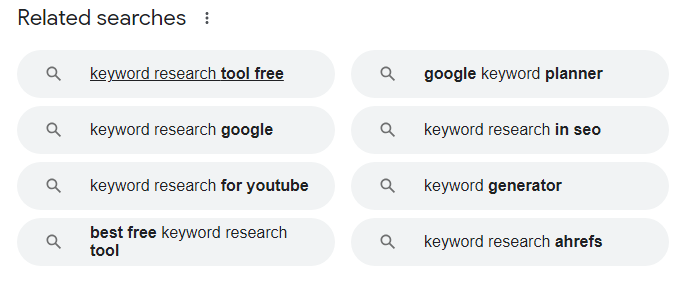Keyword research is perhaps one of the most important SEO tasks. But do you find yourself wondering what keywords are? Why should I use them? And how do I make use of these best keyword research strategies? So, want your small business to stand out from the competition? In this blog, we shall cover everything related to keywords and their research. It will help you to successfully rank your webpage on top among the SERPs once you’ve mastered it.
What are keywords in SEO?
Put simply, keywords are words or phrases people type in search engines like Google to search for what they are looking for. For example, if you’re looking for a pair of shoes, you might type something like “Shoes for men” on Google. Even if the phrase consists of more than one word it’s still a keyword.
What is keyword research?
Keyword marketing research is a practice search engine professionals use to find and research common terms or phrases that users enter in search engines when they are looking for products, services, or general information. Queries are related to keywords that are asked by users in search engines.
Why and when to implement keyword research strategies?
It is important to do keyword research as it is one of the most significant SEO tasks. It is also a great way to reach a wider range of people with our content. Keyword research is usually the first step towards the Search Engine Optimization of any website. We need to do keyword research when we’re;
- Looking for a new niche
- Looking for new content ideas
- Optimizing our existing content.
The role of keywords in achieving organic traffic and content relevance
Every user’s search query is anchored in specific keywords that reflect their intent and needs. When our website incorporates keywords that directly address and resolve user problems, it inherently excels. The effectiveness of our website in providing solutions is closely tied to the strategic use of these keywords. The organic success of our website is intricately linked to the relevance of the keywords we prioritize. Keyword is the bridge between the user’s query and our website’s content. Therefore, one should always optimize a website based on the relevant keywords that match the content.
The balance between branded and non-branded keywords
When trying to balance between branded and non-branded keywords, one should know the difference between the two. Branded keywords are used to promote the brand and help in building the brand identity. It promotes the brand name and gets registered in the user’s mind. Non-branded keywords are generic terms that users search around. They are broader terms and are searched by many people.
To strike a balance between the two, one should incorporate both terms so that the content becomes relevant to both types of consumers.
Embracing Search Intent and User Journey
The search engine machine is built upon the foundation of keywords. There are two major categories head terms and long-tail keywords. Head terms are short phrases that have high search volumes and many websites target these keywords. They are broader terms and cater to many searches. Long-tail keywords are long phrases that are specific to specified users. They give accurate results. Not every website tends to include specific long-tail keywords in the content. However, one should target both head terms and long-tail keywords for a comprehensive SEO strategy. This will ensure both the types of users are targeted.
Stages of keyword research
For the purpose of this guide, the whole process is divided into 3 main steps;
- Finding the keywords
- Analyzing the keywords
- Using the keywords
Let’s have a look in detail at each step.
How to find keywords?
Keyword strategy planning starts when you think about how potential customers might search for your business or website. You can use keyword research tools to expand those ideas and find even more keywords. It is a simple process but you need to keep two things in mind, i.e. you must have a good knowledge of your industry and understand how keyword research tools work to get the most out of them. In order to write compelling content that covers the needs of people interested in your niche, you need to know what you are looking for.
1. Audience Demographics and Psychographics
Before curating content, one should perform holistic keyword research that caters to the target audience. How do we find the target audience? When we create content we should keep our focus on the audience that will visit our website. We categorize them based on their gender, age, location, preferences, activities they perform etc.
2. Competitor Keyword Analysis
Analyzing competitor keywords to identify gaps and opportunities. We often miss out on the market trends. We should keep track of our surroundings especially when it comes to business. Analysing competitor’s keywords can give a brief idea of what we have to create. We can add some points that our competitors have missed out which will provide opportunities for our business.
– Methods for effective competitor analysis
For analysing any competitor’s strategies, one should keep in mind their demographics and their frequency of actions, like content posting on various social media channels. SWOT analysis has been considered an effective method to analyse Strengths, Weaknesses, Opportunities and Threats. Social media marketing companies can help you understand the strategies used by your competitors through different algorithms.
3. Keyword Prioritization Strategies
Keywords are crucial especially when the competition is high. But then how do you prioritise keywords based on their search volumes, traffic potential, keyword difficulty and CPC? The ideal way to move ahead with keyword strategy is to balance out all the above categories. Don’t focus on one category only as all can be mixed and generate possible leads for your company.
– Choosing keywords for different digital assets:
Website, blogs and ads involve the usage of different types of keywords depending upon the target users. Let us consider a website. A well-structured website with site audits and architecture is useful for getting ranked at the top of searches. However if the content lacks the brand keywords, long-tail, short-tail keywords and also the commonly searched keywords that resonate with the brand, then the website will not perform well on search engines. On the other hand, blogs are used to target a particular genre of audiences that are interested in reading about a topic or a user who is looking for solutions. So the keywords can be a mix of interlinking keywords, brand keywords, also keywords that have low to mid search volumes. Advertisements are more engaging content that is active for a shorter period and is not very descriptive. In short, it tries to attract users based on the campaign goals and is specific.
4. Insight and Analysis Tools for Keyword Research
Let’s look at some tools and platforms where you can find keywords,
Google Keyword Planner
Google Keyword Planner, for a long time, is the go-to free keyword tool for many people. However, over time keyword research has become even more complicated. Nowadays, most SEO solutions have replaced GKP with more advanced tools. To use this tool, you need to create a Google Ads account. This process will only take you a couple of seconds if you have a Google account already.
GKP is a great tool that offers a number of valuable data for PPC campaigns. SEO provides hundreds of keyword ideas but doesn’t fully replace a keyword tool. It can still be useful if you remember two things;
- The search volumes are often grouped based on the close variant keywords. Also, you’ll see only search volume ranges (e.g. 1K-10K) unless you spend enough money on Google Ads.
- GKP’s competition column doesn’t reflect the organic difficulty, only the competition in the PPC campaigns as it is a part of Google Ads.
Keyword research tool
The most common way to find numerous keyword opportunities is to use a keyword research tool. KWFinder, Keyword Tool, and Long Tail Pro, just to name a few are among the many tools available in the market. So should you pay for a keyword research tool? If your blog or website brings you money in any way, a keyword research tool or an SEO toolset, in general, is a great investment that will return value.
The main advantages of using a professional keyword research tool are that; it will save you a lot of time, it offers data you probably wouldn’t find anywhere else, and also provides you a competitive advantage. Finding, analyzing, and using are the three steps when it comes to keyword research.
There are two basic methods to approach the research in a keyword tool;
- Search based on a seed keyword i.e. any phrase that describes the topic, and
- Competitor-based keyword research i.e. checking your competitor’s domain to get new topic ideas and checking specific URLs to get keyword ideas for a specific topic. Once you find the competitor, simply type in the URL of their article and you’ll see other keywords the article ranks for.
Google suggests
Google provides many keyword suggestions directly in the search to help people find the most relevant results.
- Autocomplete: You may have noticed that Google tries to suggest related search queries directly in the search form. Since they are based on real searches by people, they can be a nice inspiration for interesting keywords.
- People also ask: The “people also ask” snippet is one of the features you can find on Google search results. It mostly appears for question queries and suggests other related questions. These can serve as an inspiration for long-tailed question-type keywords.
- Searches related to: This feature is very similar to autocomplete, but the suggestions are at the bottom of the results page.
Answer the public
An even easier way to extract the autocomplete suggestions is to do it automatically. One of the commonly used tools to do it for free is AnswerThePublic. Simply enter the seed keyword and it generates the autocomplete suggestions from Google and Bing for each letter in the alphabet. The generated keyword suggestions are usually based on question words (like what, how, when, where, can, will…), prepositions (for, without, too, with), and comparison words (like, versus, and, or).
YouTube suggests
Believe it or not, YouTube is the second-largest search engine in the world. Even though the keyword research in this platform has its own specifics, it can be useful for Google keyword research as well. There’re thousands of searches behind the most common or popular topics. There is a high chance that popular topics from YouTube will have a high search volume on Google as well. Another way to use You tube’s autocomplete feature is to focus on practically oriented videos for queries.
Google search console
A great way to find highly relevant keywords is to check where you rank already in the Google search console. If the article already ranks for some keywords, there is a high chance you’ll find other tail phrases it ranks for too. There are two ways to find keywords with the best potential i.e. check keywords with high impressions but a low number of clicks and check what you rank for on the second or third SERP. Based on these there are two things you can do; improve the current article to put more emphasis on the keyword or write a new post on the topic and link it to the main article.
Reddit is one of the biggest online communities that cover almost any topic you can envision. It is a great site to find people intrigued by your interests and come across subjects they discuss. Let’s say your interest is roguelike games. Firstly search for subreddits related to your niche. You’ll find that even that subject of discussion has thousands of followers in numerous subreddits. You can find a number of queries associated with the topic. They can provide you with inspiration for your next content depending on what people talk about on the internet.
Amazon
Similar to Google and YouTube, it collects data about popular search queries and offers automatic suggestions. The relevance of the suggestions is based on the product conversion rate and buying behavior. If you are an affiliate marketer or an e-commerce store owner don’t forget about Amazon.
How to analyze keywords?
Now that you have a number of keyword ideas, your main objective is to choose the ones that will bring the most value to you. There isn’t any use in optimizing hundreds of keywords right?
Each time you create new content, you should give it a focus keyword. It best represents the topic of the page and has the best properties from an SEO keyword targeting point of view. There are three key aspects to be considered.
They are:
- The popularity of the keyword: It refers to the search volume, i.e. how many people search for the given phrase. It is usually calculated as a monthly average based on the last 12 months. There are basically 2 sources of search volume data in keyword research tools, Google data (search volume from the Google Keyword Planner Database), and Clickstream data (search volume data based on the behavior of internet users collected from browser extensions, plugins, etc.)
- Keyword difficulty: It is a metric that estimates how hard it is to rank for a certain keyword. The higher the keyword difficulty, the harder it will be to rank for the keyword with your website. The difficulty metrics used in keyword tools take into consideration the authority of the website ranking in the first SERP. If there are many low–authority websites in the first SERP, there is a high chance of ranking for the keyword.
- Relevance (search intent): SERP should be an integral part of every keyword research. It helps improve the evaluation of keyword difficulty by looking at the authority of the ranking websites. Also, it helps you to discover the search intent behind the keyword to see whether the keyword is relevant to your content. The 4 basic search intent categories are; navigational, informational, transactional, and commercial.
How to use keywords?
Let’s look at some useful ideas on how to use keyword research strategies properly. They are very closely related to on-page optimization and content strategy too. These SEO tips and tricks will help boost ranking.
Think of keywords as topic
Instead of organizing the articles into artificial categories, organize them by topics divided into content hubs or structures. The topic clusters strengthen the semantic relationship between the articles. As a result, it helps search engines to better evaluate the topical relevance of the posts.
When to use the focus keyword?
Use the focus keyword when relevant. Once you have selected the focus keyword for your page, use it on the page in the key elements. Don’t overuse the keyword. The best practice is to use the exact matching keyword in the title tag, the heading of the page, the body of the page, and on anchor texts of internal links pointing to the page. Don’t try to stuff the exact match keyword into the post to meet a certain keyword density.
What about LSI keywords?
It isn’t always right to claim that LSI keywords are synonyms and related keywords will help you improve your rankings. Always remember that trying to insert some keywords into your post artificially, just because some tool told you to do so is a wrong approach. Write naturally and cover the topic thoroughly. Also, you don’t have to use every single related keyword.
Want to increase the ranking of your webpage through the use of keywords?
I’m sure now you must have most of your doubts related to keyword research strategies resolved through this blog. That being said, are you looking for a capable and trustworthy SEO service provider? Want your page to rank higher in the hands of a professional through the right use of keywords? There are a variety of digital marketing agencies that will guide your business through this ordeal. One of the best among them is Banyanbrain. Our specialized team delivers optimum results to help your business rank on top of SERPs, thereby gaining you more visibility. We also provide additional services such as paid advertising, social advertising, or designing attractive UI for your website.




